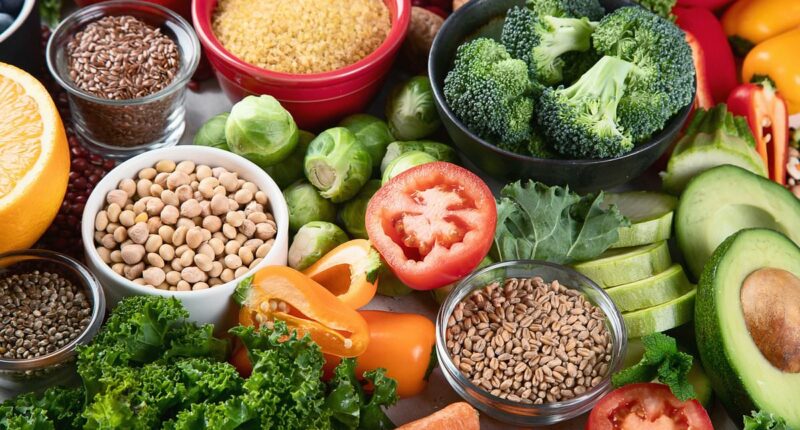Share this @internewscast.com
A prominent gut physician has issued a caution about ‘fibremaxxing’—a wellness trend that involves consuming an abundant amount of dietary fiber—arguing that it could be more detrimental than beneficial.
Those devoted to this growing social media trend over the past six months assert that adhering to it can enhance digestion, maintain a sense of fullness for longer periods, boost energy levels, and ensure regularity in bowel movements.
However, Dr. Max Gowland, a PhD-holding biochemist with more than four decades of expertise in health and nutrition, remarked, “Fibremaxxing boasts benefits like better digestion, prolonged satiety, increased energy, and alleged ‘detoxification’.”
The surge in interest has been significantly impacted by social media, where influencers post visually appealing fibre-rich dishes and smoothies that appear healthy and appetizing.
‘The trend appeals to people seeking natural ways to lose weight, manage appetite, and improve digestion without medication.
‘It is easy to market because it is measurable, as people can track grams of fibre and see their “progress.”’
Fibre is crucial for the digestive system’s healthy and normal function, as it aids in moving digested food through the intestines and bowel, ultimately exiting the colon.
Beyond combating constipation, fibre has been shown to assist in reducing cholesterol, controlling blood sugar levels, and lowering the risks of developing heart disease, type 2 diabetes, and certain cancers.

A leading expert has warned that ‘fibremaxxing’ can do more harm than good
The NHS recommends that Britons eat 30g of fibre a day—but it’s estimated that most people only consume 60 per cent of this target, a measly 18 per cent.
With this in mind, fibremaxxing seems like the perfect tonic for our bunged-up digestive systems, but a leading gut expert says you can have too much of a good thing.
Dr Gowland said fibremaxxing takes things too far. He told the Daily Mail: ‘This concept goes beyond simply eating vegetables and fruits—which is a great way to increase your intake of vital vitamins and minerals—and extends to nuts, seeds, whole grains, legumes, and fibre powders.
‘The goal is frequently to reach 40–50 grams of fibre per day or more, compared with the recommended 30 grams for adults in the UK.’
Excessive amounts—and sudden increases—of fibre can cause bloating, constipation, worsen symptoms of some conditions, and even create blockages in the digestive system.
He said: ‘Going overboard with fibre can backfire, causing bloating, gas, cramping, or constipation.
‘Too much fibre too quickly can irritate the gut and overwhelm the digestive system.’
And it can cause more than just a tummy ache—it can have a huge knock-on effect on our overall health.

Mr Max Gowland shared the risks of fibremaxxing, and how to safely add more to your diet
He added: ‘Extreme intake may reduce absorption of minerals like calcium, iron, magnesium, and zinc.’
Instead, Dr Gowland recommends that people who want to up their roughage focus on ‘balance, variety and moderation’ and urged people to increase their fibre intake gradually, while making sure that they are drinking plenty of water.
‘High-fibre diets without adequate fluids can lead to hard stools or blockages, and excessive fibre from supplements is particularly risky if combined with low water intake,’ he said.
Fibre helps slow gastric emptying, which leads to longer feelings of fullness—leading it to be compared to a ‘natural Ozempic’—he said there are two types of fibre that people need to be aware of.
These are soluble fibre, which forms a gel in the gut and supports microbiome diversity, and insoluble fibre, which adds bulk to stools and prevents constipation.
Both types contribute to gut health in different ways, and fibre plays a role in detoxification by helping remove waste and bile acids from the body.
Even modest increases in fibre can improve gut function and reduce disease risk, and it is safe and well-tolerated for most people when increased gradually.
‘Fibremaxxing can create a false sense of being “super healthy” while ignoring overall diet balance and may reduce protein or fat intake if people replace nutrient-dense foods with fibre alone.’

There is plenty of fibre available in whole foods—no extra powders or potions required
‘Balance, variety, and moderation are safer and more effective than fibremaxxing, and increasing fibre gradually while drinking plenty of water is the best approach.
‘Fibre is a tool, not a magic solution; more is not always better, and a holistic, varied diet remains key for long-term health.’
Fibre supports healthy ageing by reducing inflammation and metabolic risk and is associated with a lower risk of colorectal cancer, and can help prevent diverticular disease by keeping stools soft and easy to pass.
It can also improve gut barrier function, contributes to nutrient absorption, and can even influence mental health, as gut bacteria can affect mood and cognition.
However, many people are using fibre supplements and powders to up their intake, and this, warns Dr Gowland, can be problematic.
He said: ‘Heavily processed fibres can cause bloating and digestive discomfort, and some artificial fibres are added to foods primarily for marketing or texture, not health.
‘Also be aware that consuming excessive insoluble fibre at once, can lead to bloating or cramps, and processed “high fibre” bars may also contain added sugar, so they should not replace real foods.
‘The key is balance: a mix of soluble and insoluble fibre is ideal, introduced gradually and with adequate hydration to allow gut bacteria to adjust.’
It’s also important to note that fibremaxxing isn’t appropriate for everyone, and can make the symptoms of some conditions—particularly inflammatory bowel diseases like Crohn’s and ulcerative colitis—worse.
It can also exacerbate symptoms of irritable bowel syndrome—a common condition that causes cramps, bloating and loose stools after eating certain foods.
He explained: ‘Some people with gastrointestinal conditions, such as IBS or Crohn’s disease, may find that their symptoms worsen if they suddenly consume high fibre diets.’














